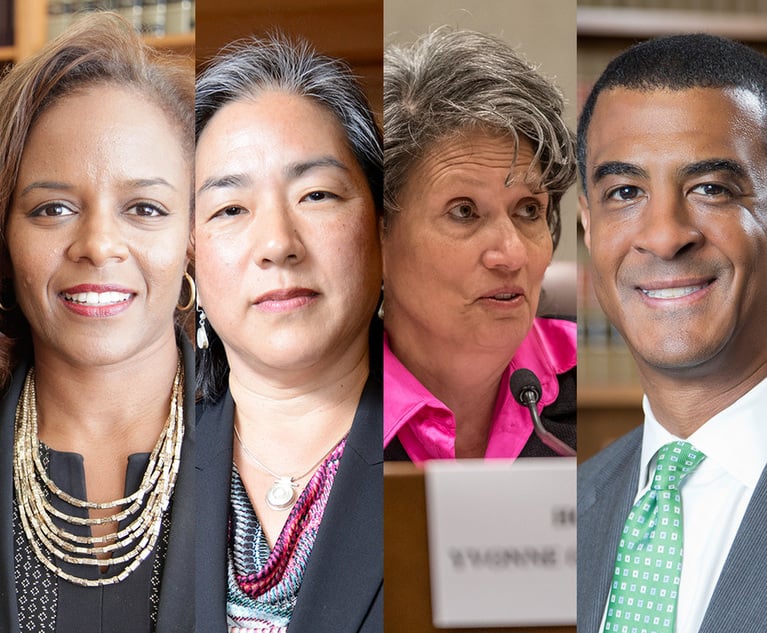Daily Dicta: Sue-and-Settle Lives On in the Trump Administration
Two years into the Trump administration, there is little discernible difference in how the government settles environmental lawsuits.
January 16, 2019 at 01:31 PM
7 minute read
 Ferruginous pygmy owl.
Ferruginous pygmy owl.
During the Obama administration, groups such as the U.S. Chamber of Commerce railed against a practice that they dubbed “sue-and-settle.”
That is, federal regulators were supposedly settling environmental lawsuits against the government by activist groups like Earthjustice and the Natural Resources Defense Council on sweetheart terms—which conservatives said amounted to a sneaky form of backdoor regulation.
Adding insult to injury, because the statutes at issue—the Clean Air Act, the Clean Water Act and the Endangered Species Act—entitle prevailing plaintiffs to attorney fees, taxpayers in effect were bankrolling the litigation.
“Every lawsuit is a profit-making enterprise,” is how William Kovacs, then the U.S. Chamber of Commerce's senior vice president for the environment, technology and regulatory affairs, put it.
With much fanfare, former EPA administrator Scott Pruitt in 2017 issued a directive to end the practice. The government would roll over and settle no more—it would stand up and fight! “The days of regulation through litigation are over,” Pruitt said.
 So, uh, how's that working out?
So, uh, how's that working out?
By at least one metric, the supposed policy change has had no impact at all.
According to Judgment Fund payment records, the feds in 2018 shelled out more or less the same amount in legal fees to settle environmental lawsuits as they did during the height of the Obama administration.
For years, I've been fascinated by the Judgment Fund—a deep well of money that the feds draw on to satisfy legal judgments or settle cases. In 2013, as part of a report for The National Law Journal, I combed through Judgment Fund numbers to figure out how much the feds had paid in legal fees to settle environmental lawsuits.
The answer: About $3 million.
In 2012, it was a bit over $4 million.
So what about 2018, two years into the Trump administration?
I crunched the numbers. And the answer is $3.3 million.
There is one slight difference. The feds settled 45 environmental lawsuits in 2018, versus 50 in 2013, so they're actually paying a bit more on average per case in legal fees now. Maybe that means they're fighting harder before settling?
But it's also not particularly cost-effective to drag out a case if you know you're going to lose. Many of the 2018 settlements are for Clean Air Act cases, where the EPA was sued, for example, for failing to meet deadlines to designate areas of the country with dangerous levels of ground-level ozone air pollution.
“There is no dispute as to liability,” noted U.S. District Judge Haywood Gilliam Jr. of the Northern District of California last year in finding for the plaintiffs on summary judgment. “Defendants admit that the Administrator violated his nondiscretionary duty under the Clean Air Act.”
What's the point of litigating that any further? All that's left to do is strike a deal on fees.
The feds folded quickly in other cases as well. For example, the EPA was sued by the Alliance for the Wild Rockies for failing to conduct a biological assessment regarding the effects of a Superfund cleanup on designated bull trout critical habitat.
Again, what's to litigate? A study was supposed to be done and it wasn't.
Government lawyers inserted this boilerplate as cover for the modest $15,000 payment for legal fees: “While defendant continues to dispute plaintiff's fee entitlement, defendant wishes to settle nonetheless to promote efficiency and preserve limited resources.”
Still, there's a difference between cases like these, where the government was sued for failing to do something it was supposed, and cases where the actions of an agency are challenged.
Both in the Obama administration and now, DOJ lawyers fight much harder to defend those cases—as they should.
For example, it took almost four years to resolve a suit by the Center for Biological Diversity and Defenders of Wildlife against the U.S. Fish and Wildlife Service challenging the agency's determination that the cactus ferruginous pygmy owl did not warrant listing under the Endangered Species Act. (“This case concerns one of Arizona's most extraordinary and extraordinarily vulnerable animals—the cactus ferruginous pygmy-owl—and federal defendants' unlawful and arbitrary decision to allow the species to be extinguished in Arizona and adjoining habitat in Mexico,” the plaintiffs wrote.)
In 2017, a federal judge in Arizona sided with the plaintiffs on summary judgment, vacating and remanding the agency's decision on the owl.
The U.S. Fish and Wildlife Service appealed to the Ninth Circuit, only to drop the appeal after a month.
Instead, the case settled, and the feds paid the plaintiffs $200,000 in legal fees.
As a taxpayer, it strikes me as a rational decision. Like it or not, the environmental statutes entitle prevailing plaintiffs to fees. If government is almost sure to lose, why run up the bill?
It's not sue-and-settle. It's smart litigation.
What I'm Reading
Judges Rebuffs Early Bid by Federal Workers to Stop Unpaid Work During Shutdown
U.S. District Judge Richard Leon, overseeing three lawsuits at a hearing in Washington, refused to issue a temporary restraining order, saying such a move potentially would have brought “chaos and confusion” and put lives at risk by shuttering government functions the executive branch has deemed essential.
AG Nominee Barr Won't Commit to Recusing From Russia Investigation
The Kirkland & Ellis counsel who previously led the Justice Department under the George H.W. Bush administration said he would make the decision to oversee special counsel Robert Mueller III's probe in “good faith.”
SF's Joseph Saveri Wins Fight Over $54 Million Fee Award in Antitrust Case
Saveri left Lieff Cabraser in 2012 to start his own firm, and became lead plaintiffs counsel in price fixing litigation against titanium dioxide suppliers that settled for $163.5 million in 2013.
Oracle Loses Bid to Thwart Labor Department Discrimination Case
Oracle's lawyers from Orrick, Herrington & Sutcliffe attempted to cast doubt on the appointment of the department's administrative law judges.
Federal Judge Says Company May Be Sued Over Harassment by Non-Employee
Addressing an issue that is unresolved by the U.S. Court of Appeals for the Third Circuit, a federal judge in Pennsylvania has ruled that a transportation company can be held liable for failing to stop an employee from being repeatedly harassed by a non-employee.
Federal Judge Strikes Down Trump Administration's Census Citizenship Question
Oh snap! Secretary Ross “alternately ignored, cherry-picked, or badly misconstrued the evidence in the record before him; acted irrationally both in light of that evidence and his own stated decisional criteria; and failed to justify significant departures from past policies and practices—a veritable smorgasbord of classic, clear-cut APA violations.”
In case you missed it…
An all-star team of seven partners from Cravath, Swaine & Moore led by firm chairman Evan Chesler will serve as lead litigation counsel for PG&E Corp. as the California utility prepares to file for Chapter 11 bankruptcy protection.
This content has been archived. It is available through our partners, LexisNexis® and Bloomberg Law.
To view this content, please continue to their sites.
Not a Lexis Subscriber?
Subscribe Now
Not a Bloomberg Law Subscriber?
Subscribe Now
NOT FOR REPRINT
© 2025 ALM Global, LLC, All Rights Reserved. Request academic re-use from www.copyright.com. All other uses, submit a request to [email protected]. For more information visit Asset & Logo Licensing.
You Might Like
View All
‘Listen, Listen, Listen’: Some Practice Tips From Judges in the Oakland Federal Courthouse

Litigators of the Week: A Knockout Blow to Latest FCC Net Neutrality Rules After ‘Loper Bright’

An ‘Indiana Jones Moment’: Mayer Brown’s John Nadolenco and Kelly Kramer on the 10-Year Legal Saga of the Bahia Emerald

Litigators of the Week: A Win for Homeless Veterans On the VA's West LA Campus
Trending Stories
- 1States Accuse Trump of Thwarting Court's Funding Restoration Order
- 2Microsoft Becomes Latest Tech Company to Face Claims of Stealing Marketing Commissions From Influencers
- 3Coral Gables Attorney Busted for Stalking Lawyer
- 4Trump's DOJ Delays Releasing Jan. 6 FBI Agents List Under Consent Order
- 5Securities Report Says That 2024 Settlements Passed a Total of $5.2B
Who Got The Work
J. Brugh Lower of Gibbons has entered an appearance for industrial equipment supplier Devco Corporation in a pending trademark infringement lawsuit. The suit, accusing the defendant of selling knock-off Graco products, was filed Dec. 18 in New Jersey District Court by Rivkin Radler on behalf of Graco Inc. and Graco Minnesota. The case, assigned to U.S. District Judge Zahid N. Quraishi, is 3:24-cv-11294, Graco Inc. et al v. Devco Corporation.
Who Got The Work
Rebecca Maller-Stein and Kent A. Yalowitz of Arnold & Porter Kaye Scholer have entered their appearances for Hanaco Venture Capital and its executives, Lior Prosor and David Frankel, in a pending securities lawsuit. The action, filed on Dec. 24 in New York Southern District Court by Zell, Aron & Co. on behalf of Goldeneye Advisors, accuses the defendants of negligently and fraudulently managing the plaintiff's $1 million investment. The case, assigned to U.S. District Judge Vernon S. Broderick, is 1:24-cv-09918, Goldeneye Advisors, LLC v. Hanaco Venture Capital, Ltd. et al.
Who Got The Work
Attorneys from A&O Shearman has stepped in as defense counsel for Toronto-Dominion Bank and other defendants in a pending securities class action. The suit, filed Dec. 11 in New York Southern District Court by Bleichmar Fonti & Auld, accuses the defendants of concealing the bank's 'pervasive' deficiencies in regards to its compliance with the Bank Secrecy Act and the quality of its anti-money laundering controls. The case, assigned to U.S. District Judge Arun Subramanian, is 1:24-cv-09445, Gonzalez v. The Toronto-Dominion Bank et al.
Who Got The Work
Crown Castle International, a Pennsylvania company providing shared communications infrastructure, has turned to Luke D. Wolf of Gordon Rees Scully Mansukhani to fend off a pending breach-of-contract lawsuit. The court action, filed Nov. 25 in Michigan Eastern District Court by Hooper Hathaway PC on behalf of The Town Residences LLC, accuses Crown Castle of failing to transfer approximately $30,000 in utility payments from T-Mobile in breach of a roof-top lease and assignment agreement. The case, assigned to U.S. District Judge Susan K. Declercq, is 2:24-cv-13131, The Town Residences LLC v. T-Mobile US, Inc. et al.
Who Got The Work
Wilfred P. Coronato and Daniel M. Schwartz of McCarter & English have stepped in as defense counsel to Electrolux Home Products Inc. in a pending product liability lawsuit. The court action, filed Nov. 26 in New York Eastern District Court by Poulos Lopiccolo PC and Nagel Rice LLP on behalf of David Stern, alleges that the defendant's refrigerators’ drawers and shelving repeatedly break and fall apart within months after purchase. The case, assigned to U.S. District Judge Joan M. Azrack, is 2:24-cv-08204, Stern v. Electrolux Home Products, Inc.
Featured Firms
Law Offices of Gary Martin Hays & Associates, P.C.
(470) 294-1674
Law Offices of Mark E. Salomone
(857) 444-6468
Smith & Hassler
(713) 739-1250






